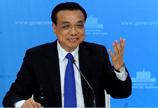
Chinese premier calls for peace, economic integration in East Asia
Comments Print Mail Large Medium SmallNAY PYI TAW -- Chinese Premier Li Keqiang on Thursday called for maintaining peace and stability in East Asia and pushing forward regional economic integration and common development.
Li, who is here for a series of leaders' meetings on East Asian cooperation and an official visit to Myanmar, said that the fundamental reason for East Asia's rapid development is a peaceful and stable regional environment.
Stressing that durable peace and stability require the backing of strong institutional arrangements, he said at the 9th East Asia Summit that China and the Association of Southeast Asian Nations (ASEAN) members are discussing the possibility of concluding a treaty on good-neighborliness, friendship and cooperation.
"The treaty is aimed at providing an institutional framework and legal guarantee for peaceful co-existence between the two sides from generation to generation," Li said.
He said China is willing to sign legal documents with more countries in the region on good-neighborliness and friendship, and to discuss the security concept and framework that are in line with the regional situation.
On non-traditional security, Li stated that China stands ready to work with others in the region to address issues including terrorism, infectious diseases, climate change and disaster management.
Regarding the maritime issues, the premier said the situation in the South China Sea is on the whole stable and the freedom and safety of navigation in the region is ensured.
China and ASEAN members have identified the dual-track approach for dealing with the South China Sea issue, he said, according to which specific disputes are to be solved through negotiations and consultations by countries directly concerned and peace and stability in the region be jointly upheld by China and ASEAN countries working together.
"China and ASEAN agreed to actively carry out consultation to reach, on the basis of consensus and at an early date, a code of conduct in the South China Sea, for which early harvest has been achieved," Li said.
"In seeking the settlement of disputes, China proposes that relevant countries actively explore joint development, as this is a realistic and effective way to management differences," he added.
To achieve regional economic integration, the premier urged cooperation in six key areas, including promoting trade and investment facilitation, accelerating interconnectivity, expanding financial cooperation, stepping up poverty reduction cooperation, advancing maritime cooperation as well as intensifying people-to-people exchanges.
He said that China will work with other parties to conclude negotiations on the Regional Comprehensive Economic Partnership (RCEP) before the end of 2015, and called for strengthening financial and fiscal cooperation with a special focus on improving the Chiang Mai Initiative Multilateralization, which is expected to effectively relieve regional short-term liquidity strains.
Li also called on all parties to advance East Asia maritime cooperation. With next year being the Year of Maritime Cooperation between China and ASEAN, the two sides should take this opportunity to strengthen the dialogue between their maritime law enforcement organs and to well implement the projects under the China-ASEAN Maritime Cooperation Fund, he noted.
Leaders at the summit agreed that the East Asian countries should further expand dialogues, deepen pragmatic cooperation and advance regional economic integration so as to enhance the peace, stability, development and prosperity in the region and the world at large.


